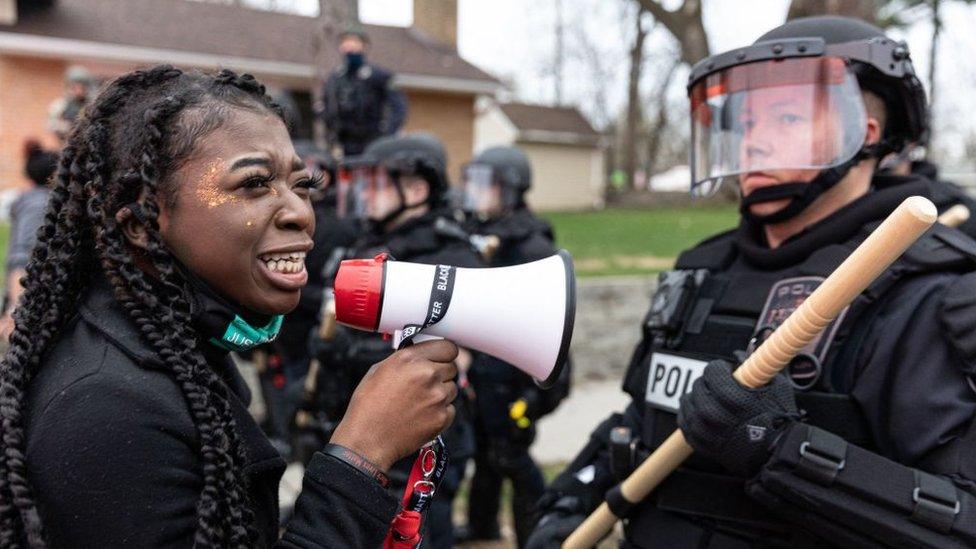US election 2020: The great dividing line of this campaign
- Published
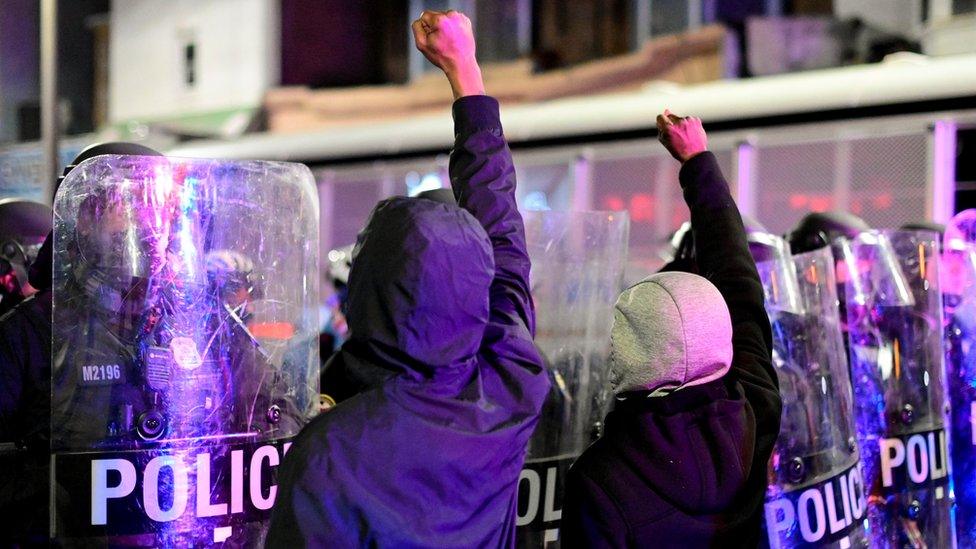
Protests have broken out in Philadelphia in recent days following the police shooting of Walter Wallace
An African American is killed by police. Protests follow. Some turn violent. It's been a recurring story of 2020. But as much as the vast numbers on the streets reflect a movement for greater equality and for change, the backlash to the demonstrations also galvanised support for President Donald Trump, revealing one of the great dividing lines of this election.
Just days before polling day, another tragedy followed by nights of unrest reminds us of one of the central issues of the US election, one which many say is driving their vote.
But what exactly that issue is depends upon which side of the great American divide the voter finds themselves.
For some, the fatal shooting by police of Walter Wallace in Philadelphia is yet more evidence that sweeping change is needed to tackle the twin scourges of police brutality and systemic racism.
Mr Wallace was a 27-year-old black man who was carrying a knife and had, it appears, been suffering a mental health crisis. His family say they had called the emergency services themselves, but for medical help.
"Our hearts are broken for the family of Walter Wallace Jr, and for all those suffering the emotional weight of learning about another black life in America lost," began a statement from Joe Biden.
For some Americans though, it is the civil unrest in the aftermath of the killing that is their focus. President Trump speaks to those voters with his strong law and order messaging, talking of the rioting and looting.
Walter Wallace Jr's father has called for an end to the violence and looting
"You can't let that go on. Again, a Democrat-run state, a Democrat-run city, Philadelphia."
President Trump is once again facing accusations, in what is a key battleground state, that he is stoking unfounded fears of chaos and lawlessness under a prospective Biden administration.
But there are those who feel strongly that the president is right and just in the past few months we have met them in cities around the country.
Take Holly Tuttle-Bathuly, who was among those turning out on in early September - amidst the "Thank you" placards and American flags - to greet Mr Trump when he visited Kenosha, in another crucial electoral state, Wisconsin.
"He is the only one who helps us, who else can help us?" she said. "I just want to encourage him to continue to have our backs."
The president was visiting the week after Jacob Blake, a 29-year-old African-American, was shot seven times in the back and paralysed by an officer.
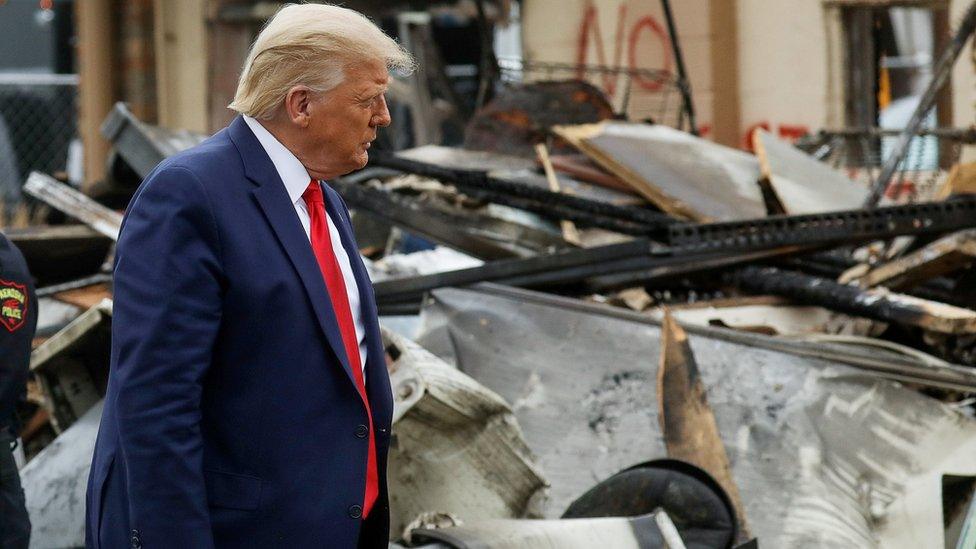
Donald Trump visited Kenosha in September
But when Trump supporter Tuttle-Bathuly talked of needing help, she was referring to the protests that followed.
During two nights in particular, there was a considerable amount of vandalism and destruction of property and businesses in downtown Kenosha.
But there was also loss of life - two demonstrators were allegedly shot dead by a 17-year-old vigilante, Kyle Rittenhouse, who had travelled from a neighbouring state.
"I take absolutely no responsibility for what happened, the [Democratic] authorities failed us and were unable to keep us safe," says Kevin Mathewson, who put out the call on social media for people to come with their weapons in "defence" of the city.
Clive Myrie goes to the crucial state of Arizona, where black votes could decide who wins
During the summer, the killing of George Floyd by a police officer in Minneapolis was the impetus for many Americans to take to the streets to protest against racism and police violence.
But it was those demonstrations and the violence that sometimes went with it that was the motivation for Mr Mathewson to set up a militia group, the Kenosha Guard.
He also approves of Mr Trump's handling of the situation and his focus on saying he stands with law enforcement agencies. Mr Mathewson says it is a key factor for him and others around him voting the way they intend to.
"Joe Biden hurts his campaign because he's less of a law and order candidate. He's more of one of those 'Let it burn, let these people get their frustrations out' kind of guy."
Mr Biden has repeatedly and unequivocally condemned any violence associated with this year's demonstrations, but clearly some are not listening or remain unconvinced.


Mr Mathewson, leader of the Kenosha Guard militia, says he empathises with the "other side" and denounced racism.
Back on the street in Kenosha with the Trump supporters awaiting the president, Ms Tuttle-Bathuly was open about her feelings.
"Black lives matter, but so do white lives. There's white people shot by the police too," she says, echoing an argument the president has made. Though when it is pointed out that proportionally black people are killed in police interactions at a far higher rate, she goes further.
"Why are they committing more crime then? I mean, if it was more white people committing crimes, would our percentage be higher," she says.
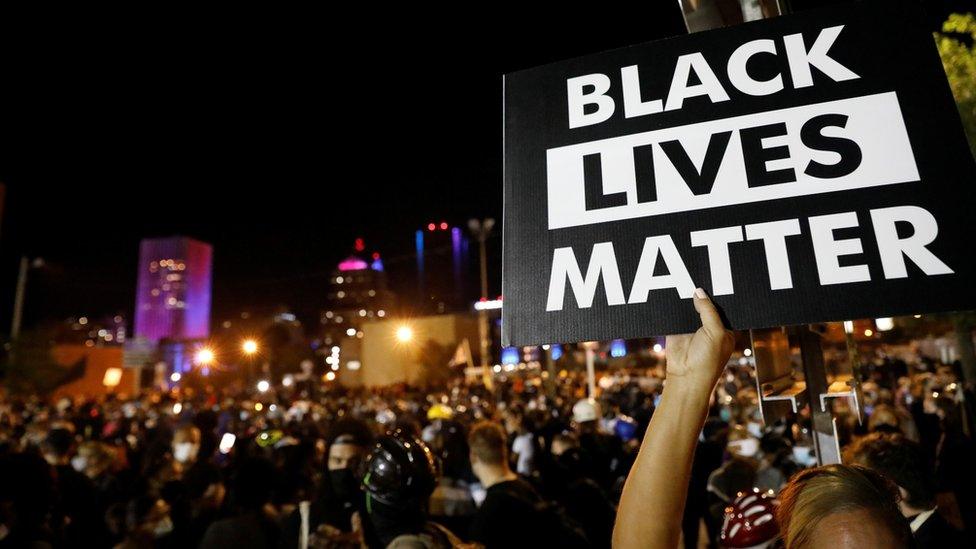
Black Lives Matter protests have been held across the US this year
Ms Tuttle-Bathuly said she did not feel the videos showing police shootings showed the full story, saying they were being used by critics of Mr Trump to foster discontent, something that made her all the more determined to vote for him again.
Among the visitors to Kenosha during this turbulent time were relatives of George Floyd, still coming to terms with a brutal killing that the world had witnessed.
They had seen the video of the shooting of Jacob Blake by a police officer in Kenosha and felt compelled to come to stand in solidarity with those demanding change.
Having had 3 months to think about what that change would look like, in order to ensure black people did not continue to suffer and even die in interactions with police, Cortez Rice one of George Floyd's nephews felt it had to start now with one crucial step.
"Vote. Voting is a huge part of this. Vote him out," Mr Rice says.
"Look at what Trump has done out here now - he condemns the protests and not his people who are going out shooting people. We need to change laws and rules for police and people in power need to understand that if they are not for this change, then we are going to change them and vote them out."
During his visit to Kenosha, the president did not meet the family of Jacob Blake, but instead focused on seeing law enforcement agencies.
In a telling moment, he was asked by a reporter whether he thought systemic racism was a problem in the US.
"Well, you just keep getting back to the opposite subject. We should talk about the kind of violence we've seen in Portland and here and other places," the president responded.
Portland in Oregon has seen months of nightly anti-police protests since the end of May, with demonstrators regularly clashing with officers in a pocket of the downtown area of the city.
One Trump supporter from a far-right group who came to agitate the protesters was even shot and killed by an anti-fascist activist who later died in a police raid on his home.
"Keep pushing": Washington DC protesters on keeping the momentum going
But again, just as the killing of George Floyd has been a rallying cry for Portland's demonstrators and has encapsulated the grievances and hurt felt by many, so the demonstrations themselves have triggered a reaction on the right and is seen as something that exemplifies the profound threat to society as others see it.
The ongoing protests in the heart of Portland were certainly the basis of the call to arms at a counter-demonstration in the suburbs of the city organised by the neo fascist group, the Proud Boys.
"My brothers and sisters in this city have faced looting, burning, assaulting, murdering, we're here to shut this down," said one 'Proud Boy' who had travelled across the country from North Carolina to attend the gathering of a few hundred people, though he did not want to give his full name.
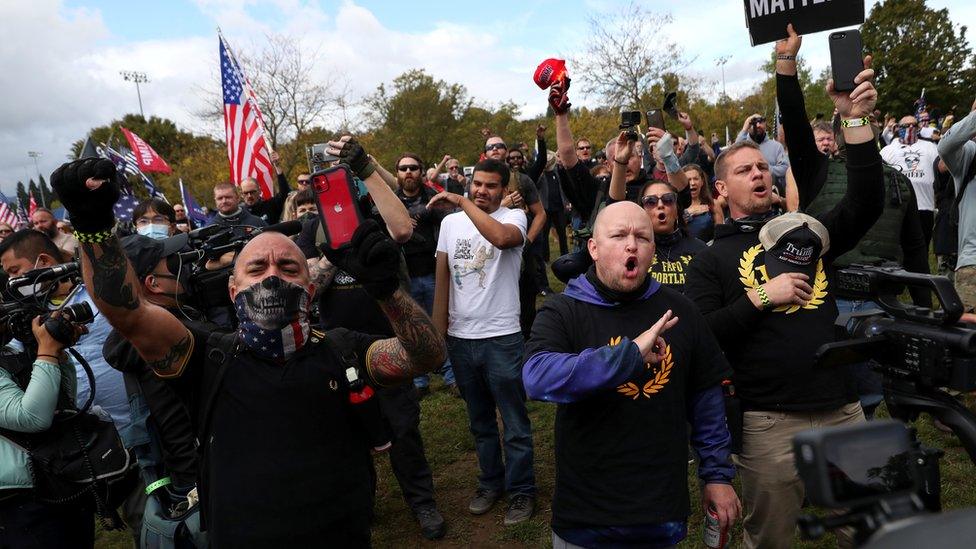
Neo fascist group Proud Boys has rallied in Portland
Not far away, Black Lives Matter demonstrators in Portland said they would only stop taking to the streets when tangible steps are being taken to address the problems.
"If you don't want riots, maybe you should listen," says Luis Enrique Marquez, a leftist activist.
"The critics see anti-fascists as the problem, but they don't see that the problem is really systemic racism from the state that means black lives and brown lives do not matter and are cheap in this country, and nothing has changed there since George Floyd was killed." he said.
Racism in the US: Is there a single step that can bring equality?
Luis Marquez has no faith in the Trump administration ever taking concrete steps to address racism or even acknowledge that it intrinsically exists in the system, and he felt that was partly down to the people Donald Trump is trying to appeal to.
"I am not against Republicans," says Mr Marquez. "I am against racists, and I am not saying all Republicans are racists, but all racists appear to be Republicans and that is who Donald Trump is playing to."
Back at the far-right rally, where Trump 2020 flags and regalia were all around, the "Proud Boy" we spoke to did not accept that the activists had legitimate reason and indeed right to protest.
"They won't leave the streets. Every new moon, there's a new issue. All of a sudden, this is racist and that is racist or something else is racist. It's like a mudslide, they just keep pushing and pushing. But we will stop them. I hope Donald Trump is watching," the Proud Boy said.
Her ancestors enslaved mine. Now we're friends
The talk of the Proud Boy gathering was the ongoing unrest in the city but it was also of the election and the importance of voting.
Just as the focus of Black Lives Matter and anti-fascist and anti-racist demonstrations have to some extent been on the need to vote out Mr Trump, the focus of the far-right rally had been to vote to ensure he stays in office.
A few days later the Proud Boys revelled in the president's message for them to "stand back and stand by" at the first presidential debate, pivoting on the violence of the left when he was asked to condemn white supremacist groups.
Exactly four years ago, in the days leading up to the 2016 election in Forsythe County in Georgia, I met an enthusiastic Trump supporter called Darcy Butkus.
She told me that she had never been a political animal but that one event had angered her so much that it made her decide to fight for change in her country and ultimately support Donald Trump; the Black Lives Matter protests in Ferguson, Missouri.
It was not the 2014 shooting of the unarmed black teenager, Michael Brown there that had spurred her into action, it was what she saw as the lawlessness that followed.
How then does Darcy Butkus feel about the fact that the protests this year were far more widespread and disruptive than anything that has happened in the United States for many years, and all under the watch of the man she had voted for because of what she saw as his law and order credentials.
"These people who run these states and cities hate Trump so much they will do everything in their power to get him out of office," she says, insisting that Democratic led jurisdictions have allowed riots and violence to take place unabated simply in order to make the White House administration look bad.
"But people will see this and it will only make people vote for Donald Trump," she says.
This is a conspiracy theory that has of course been peddled by the president himself, but the fact that some might believe it is a sign of just how polarised American society has become. It's something that will not be resolved with this election, whatever the result.

How do US presidential elections work?: All you need to know
Four years of President Trump: A look back at his time in office on BBC iPlayer (UK only)

- Published30 September 2020
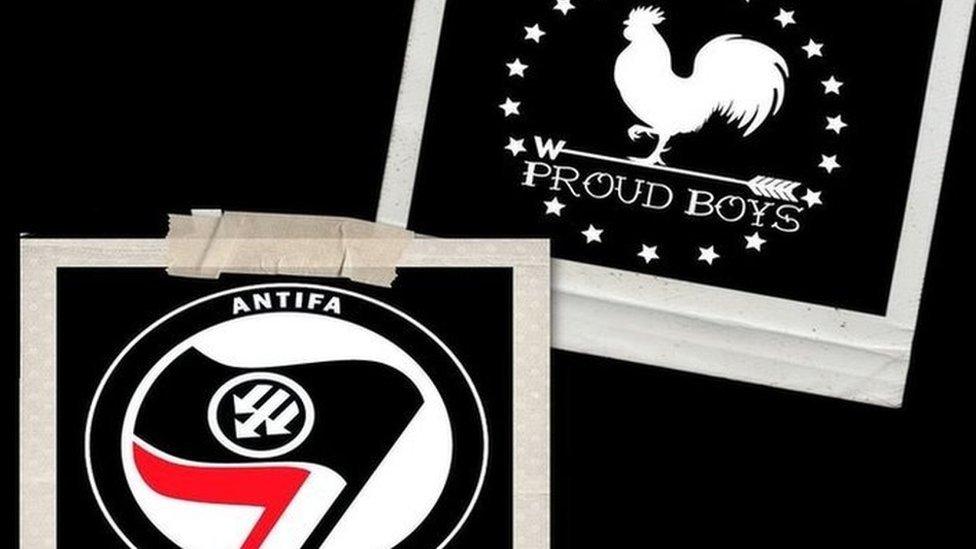
- Published3 November 2020
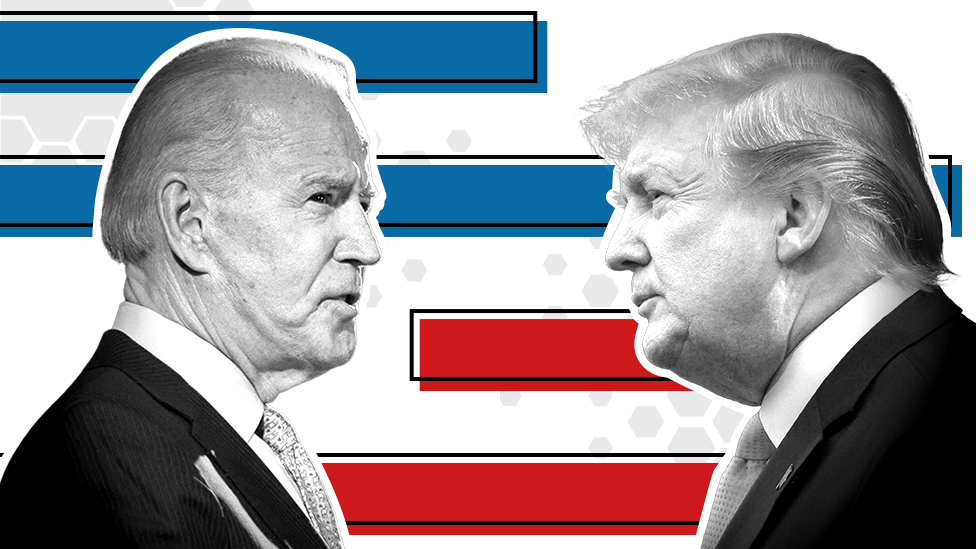
- Published21 April 2021
